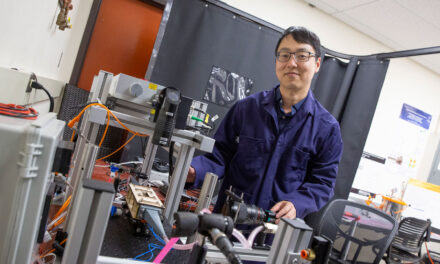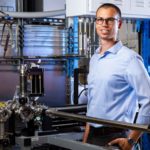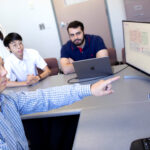
The Polytechnic School welcomes its new faculty members
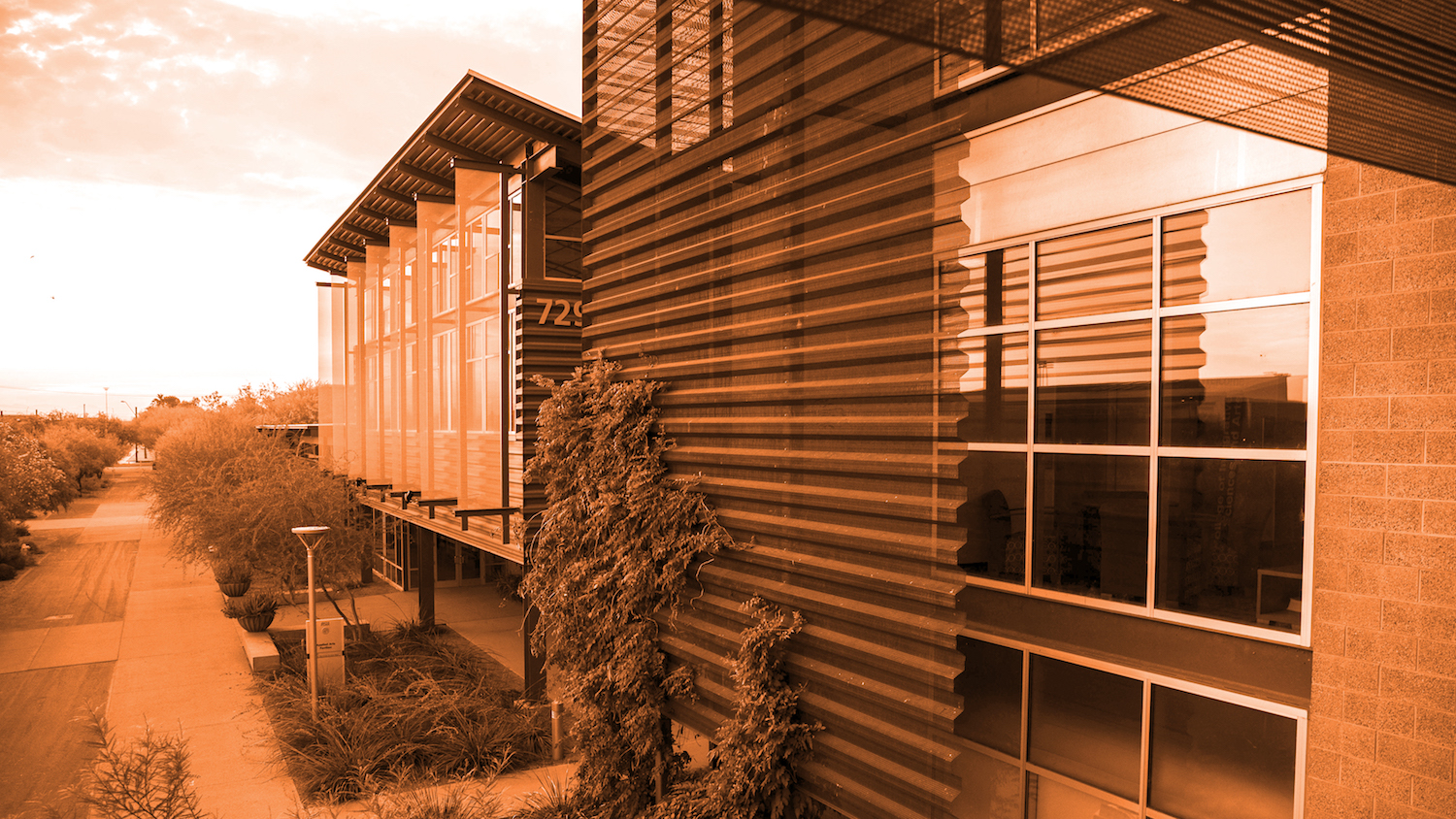
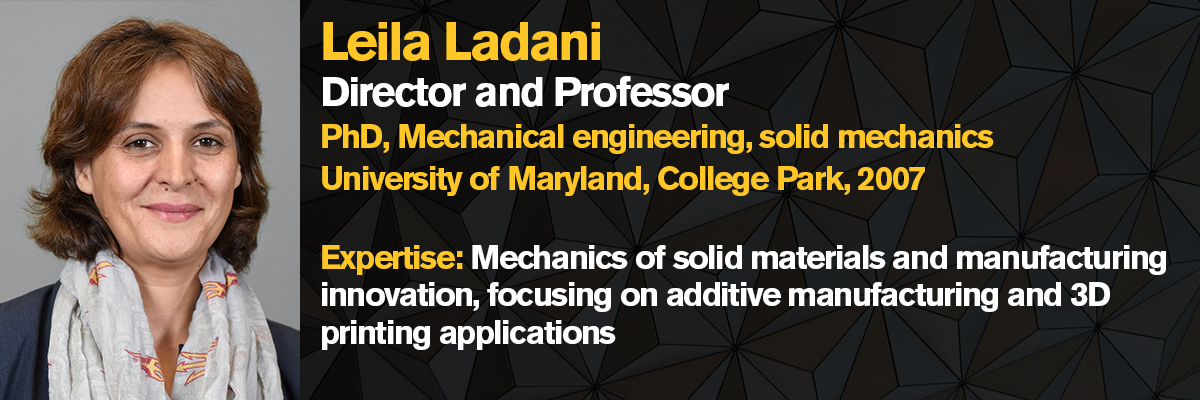
Leila Ladani - Director of The Polytechnic School and Professor
“Analytical and goal-oriented” are the dominant character traits Leila Ladani says best describe her.
She recalls exhibiting those proclivities at an early age when she was drawn to math and science in her first years of school — and in later years when she chose to pursue an engineering career.
From such personal characteristics sprung a “passion for learning and love for education,” Ladani says, that have led to success in her career as a scientist, researcher and leader in her profession.
More recently, that zeal guided Ladani’s decision to accept an offer to become the director of The Polytechnic School, one of the six schools in the Ira A. Fulton Schools of Engineering at Arizona State University. The Polytechnic School is home to seven academic programs, more than 5,500 students and 200 faculty and staff members.
In her analysis, ASU is taking academics and research in the directions they need to go to help the world overcome its numerous and varied challenges.
“I chose ASU because of its culture, which promotes innovation and access to education for all,” Professor Ladani says. “This is a place where change and progress is expected and encouraged.”
Especially enticing to Ladani is the progress being made toward fulfilling ASU President Michael Crow’s vision for the university.
“ASU is a world-class research institution that is also providing a high-quality education and research opportunities to a wide spectrum of students from many different backgrounds,” she says. “I find that inspiring.”
Ladani sees another encouraging sign in the university’s break from traditionally strict separation of academic disciplines and research endeavors. That multidisciplinary approach to both education and research is in ascendance at The Polytechnic School, she says.
“There are engineers working with psychologists to come up with ways for soldiers to achieve higher performance on the battlefield,” she says. “That is only one example of research collaborations that have the potential to be transformative for society in the near future.”
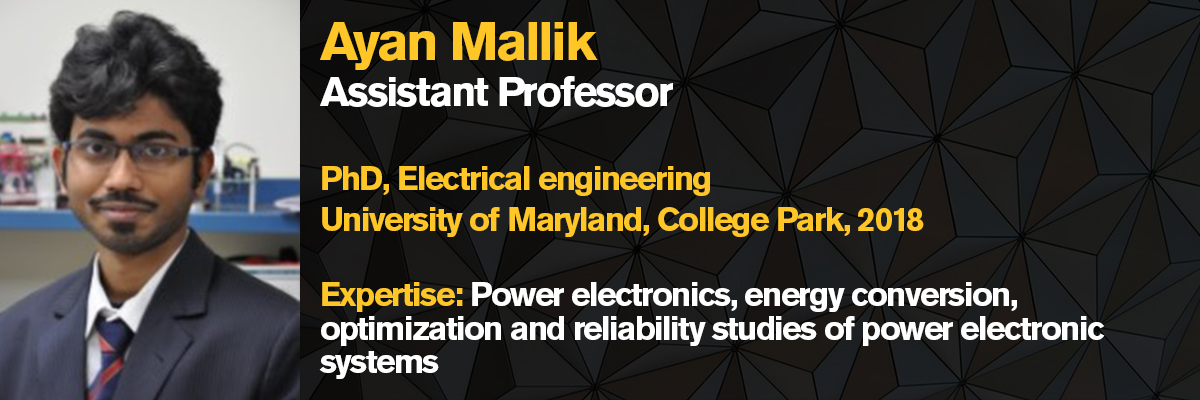
Ayan Mallik - Assistant Professor
Ayan Mallik sees his responsibility as an educator as more than preparing students for careers. He wants to supply the world with more highly skilled engineers to help alleviate looming threats to the well-being of the planet’s inhabitants.
Continuing population growth and sprawling industrialization are just two of the trends increasing the possibility of widespread energy crises. It’s one of several big resource shortage challenges Mallik says make it of “immense importance” to achieve advances in his field of power electronics.
His research focus is on electrical energy conversion. Innovation in that domain would have benefits in areas ranging from transportation, data center power supply, wireless power transfer, solar-energy photovoltaics and consumer electronics.
The biggest impact Mallik wants his work to have is on enabling a transition from conventional electrification systems to technologies that provide “clean, efficient and renewable energy.”
Mallik says he chose to join Arizona State University because its “interdisciplinary nature” opens the door to creative research collaborations to achieve that goal with the aid of colleagues in a variety of engineering and science specialties.
He hopes to also develop unique courses that give students both a stronger grasp of the theoretical foundations of electrical engineering and deeper insights into practical solutions to real-life power systems problems.
His students should be prepared to be pressed to “think outside the box,” to strengthen their analytical skills and develop “a passion for learning,” he says.
Mallik comes to ASU after having won more than a dozen awards in the past five years that attest to his talents as a scholar, researcher and inventor.
Most notably he earned a first-place award for his doctoral dissertation from the University of Maryland’s engineering school and the university’s Invention of the Year Award. He was also one of 10 finalists in an International Future Energy Challenge competition organized by the Institute of Electrical and Electronic Engineers.
Mallik’s pursuits outside of engineering include solving math puzzles and playing soccer, table tennis and chess.
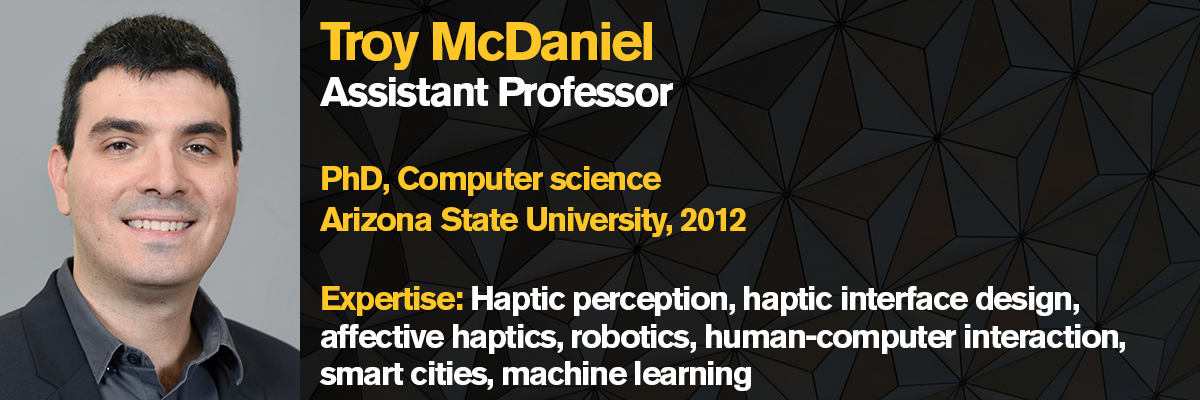
Troy McDaniel - Assistant Professor
Troy McDaniel is passionate about how the science of our sense of touch — the field of haptics — can help people with disabilities. Since he was a senior in the undergraduate computer science program at ASU, he has contributed to and published award-winning research in assistive and rehabilitative technologies as part of ASU’s Center for Cognitive Ubiquitous Computing, or CUbiC.
“The field of haptics has incredible potential for technological advancement and human augmentation,” McDaniel says. “The field is still in its infancy, so many exciting problems and questions remain.”
McDaniel’s research focus and areas of expertise extend well beyond the field of haptics, as he believes an interdisciplinary approach makes the biggest impact.
“The most exciting discoveries and innovations happen at the confluence of disciplines, so I’ve studied artificial intelligence, machine learning, computer vision, robotics, psychology and neuroscience to enrich my haptics research,” he says.
McDaniel chose and stayed at ASU for several reasons: an innovative work environment, faculty members who are passionate, supportive and eager to collaborate, and the wealth of resources and opportunities ASU provides to nurture success.
In the fall, he joins The Polytechnic School faculty to teach courses in information technology, engineering, and human systems engineering. Students taking IFT 510: Principles of Computer and Information Technology Architecture should be prepared to gain an in-depth understanding of computer architecture, system software, operating systems, networking and other important related issues in an IT context. McDaniel says it will help students build a technical foundation to understanding how many current technologies work.
In 2018 and 2019, while working as an assistant research professor in the Fulton Schools, McDaniel earned Top 5% Teaching Awards, which recognize Ira A. Fulton Schools of Engineering faculty for outstanding contributions to education. The awards were for his teaching in the School of Computing, Informatics, and Decision Systems Engineering.
This semester, he will complete a research project investigating how temperature and complex vibrotactile (sensing vibration through touch) patterns influence and evoke human emotion.
“These findings will aid the design of next-generation human-computer interfaces that engage our sense of touch,” McDaniel says.
Outside of the lab, McDaniel has taken his work to competitions. In 2019, he and Keep Calm, a team of ASU graduate students in computer science and biomedical engineering, won the ASU Virtual Reality Innovation Challenge for work in VR and wearable technologies to understand and overcome anxiety.
During his down time, McDaniel enjoys reading, racquetball, table tennis and rock climbing, and he’s currently learning Japanese.
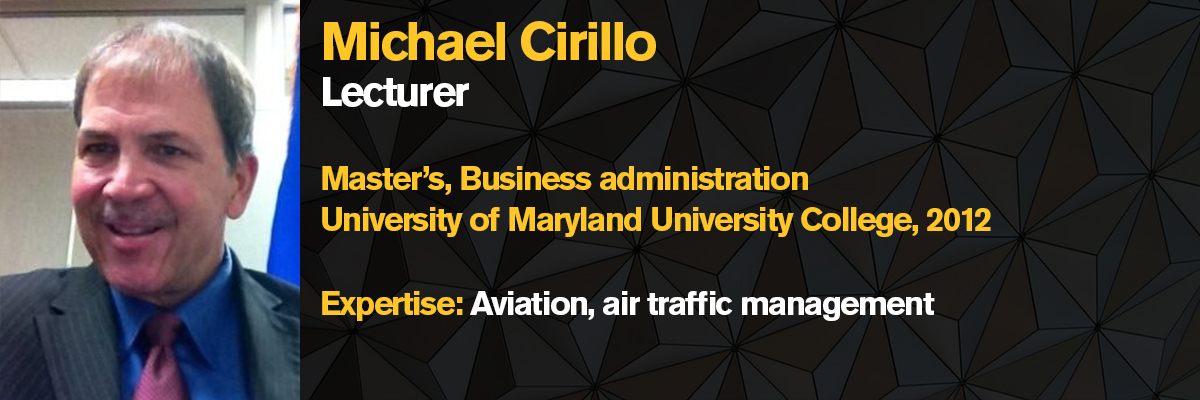
Michael Cirillo - Lecturer
Michael Cirillo comes to Arizona State University with 41 years of experience in aviation and aerospace, having been an air traffic controller and an executive with the Federal Aviation Administration.
“I can think of no more rewarding way to spend my final years in the industry than to launch the next generation of aviation professionals,” says Cirillo.
Cirillo will be teaching classes on terminal air traffic management, where students will learn not only the policies and procedures associated with air traffic control, but also the role aviation plays in the economy and the quality of our lives.
“ASU is the premier, FAA-endorsed Collegiate Training Initiative program in the country,” he says. “It is an honor to join the ASU faculty.”
Learn more about the newest faculty in the Ira A. Fulton Schools of Engineering:
School of Biological and Health Systems Engineering
School of Computing, Informatics and Decision Systems Engineering
School of Electrical, Computer and Energy Engineering
School for Engineering of Matter, Transport and Energy
School of Sustainable Engineering and the Built Environment
Academic and Student Affairs



